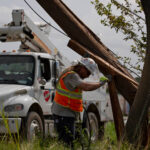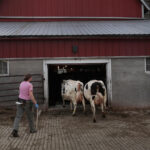In May, amid shutdowns brought on by the Covid-19 pandemic, the University of North Carolina at Chapel Hill announced tentative plans to reopen its campus in early August.
Those plans persisted despite an outbreak in July among players and staff in the university’s athletic department. And they weathered fierce opposition from some Chapel Hill-area residents, who worried that the influx of students would fuel a rise in cases in the town.
“The idea that 20,000 18- to 20-year-olds … will suddenly be walking around Chapel Hill coming from all over the country is frankly terrifying,” one resident told the Raleigh News and Observer last month. “The university should be ashamed of itself for prioritizing student tuition and money over the lives of Chapel Hill citizens.”
Despite the pushback, classes resumed on Aug. 10, with a mix of online and in-person instruction for undergraduates. Within a week, a rash of positive cases landed hundreds of students in isolation and quarantine. On Monday, the university announced it was shifting entirely to remote instruction for undergraduates and sending many students home again.
The announcement comes as many schools and universities across the country continue to rethink reopening plans for the fall semester. In response to rising cases, Notre Dame has delayed in-person classes for two weeks, and Michigan State, abandoning its reopening plans, has asked undergraduates to continue their education this fall remotely.
Universities have struggled for months to find a balance between the interests of faculty, students, parents, and the surrounding communities in developing their reopening plans. On Thursday, the head of the UNC system blamed the behavior of “a very small number of students” for the school’s failed reopening. But an editorial in the Daily Tar Heel, the university’s student newspaper, charged the university administration with poor planning, describing the situation as “a clusterfuck.”
Tensions have risen on other campuses as well: Purdue University suspended 36 students this week for attending a party that violated university rules. And a gathering at Syracuse University this week, which violated New York State public health laws, led the school’s vice chancellor to warn that “a large group of first-year students” had “selfishly jeopardized the very thing so many of you claim to want from Syracuse University — that is, a chance at a residential college experience.”
Some analysts saw this coming. “Students will get infected, and universities will rebuke them for it; campuses will close, and students will be blamed for it,” epidemiologist Julia Marcus and psychiatrist Jessica Gold wrote in The Atlantic in July. Putting the onus on students, they argued, “rather than deploying the public health infrastructure needed to control a disease that spreads easily among people who live, eat, study, and socialize together, is not a safe reopening strategy.”
Also in the News:
• Venezuelans returning home from other countries are being held in crowded containment centers in an attempt by the government to slow the spread of Covid-19. According to interviews, cellphone videos, and government documents, Venezuelan military forces are holding detainees under guard as they await testing. Some detainees report they’ve been required to take medications that are not proven to treat the virus and had to go without treatment for pre-existing conditions. “They told us we’re contaminated, that we’re guilty of infecting the country,” Javier Aristizabal, a nurse from the country’s capital of Caracas, told The New York Times. Videos have shown unsanitary conditions in the containment centers, where people are unable to adequately practice social distancing. Meanwhile, top Venezuelan officials are able to get treatment at private clinics or visit Caracas’ military hospital. And those with means who return to the country can simply pay to skip quarantine. (The New York Times)
• An analysis of almost 2 million hospital birth records from the state of Florida, published this week in the Proceedings of the National Academy of Sciences (PNAS), found that Black babies had a dramatically improved survival rate if the attending physician was also Black. Examining records from 1992 to 2015, the researchers found that, when Black newborns were in care of a White doctor, they were around three times more likely to die in the hospital than White newborns. Having a Black doctor cut that disparity in half. Although the analysis was limited to finding a statistical correlation, the researchers did suggest a range of possible reasons for the difference, including the potential for implicit bias from White doctors, and the possibility that Black doctors built a more trust-based relationship with parents. Last year, the Centers for Disease Control and Prevention (CDC) reported that, over all, Black infants in the U.S. have more than twice the risk of dying as White infants. “Black babies have been dying at disproportionate rates since as long as we’ve collected data,” wrote health policy researcher Rachel Hardeman, a co-author of the PNAS study, on Twitter. “The time is now to change this and to ensure that Black infants are afforded the opportunity to thrive.” (CNN)
• A study released Monday by the American Health Care Association showed a marked increase in Covid-19 cases in U.S. nursing homes. In the last full week of June, the report found, nursing homes reported 5,480 new Covid-19 cases and 1,601 deaths. By late July, the weekly case count was 77 percent higher — and deaths had risen to 1,706 in the final week of that month. The spread of nursing home cases has largely taken place in the Sunbelt states of the American South and West, which were hit later than New York, New Jersey, and other states in the Northeast that experienced major Covid-19 outbreaks in the spring, including high death tolls in nursing homes. “As the virus surges in Sunbelt states, there’s no reason to think it won’t affect nursing homes in the same way it did in states that surged earlier,” University of Chicago research professor and long-term care specialist Tamara Konetzka told The Associated Press. (The Associated Press)
• And finally: This week, President Donald Trump’s administration approved a plan to open up Alaska’s Arctic National Wildlife Refuge to oil drilling — to the consternation of environmental activists and the befuddlement of some business analysts. The approval marks the culmination of a 30-year lobbying effort to bring drilling to the 19-million-acre region in northern Alaska. Oil leases are expected to start going up for auction around the end of the year and must be sold by December 2021, a mandate that legal experts say will make it more difficult for Democratic leaders to undo the decision if they win the White House in the next election. But some analysts say “it’s a bizarre time” for the Trump administration to open up the refuge for drilling, with crude oil prices low and many financiers already trimming their oil industry portfolios. Banks are also worried about backlash from socially conscious investors, said one market strategist, and several have already specifically ruled out funding drilling in the refuge. Writes business journalist Matt Egan at CNN, “the world simply does not need more oil right now.” (The Wall Street Journal)
“Also in the News” items are compiled and written by Undark staff. Deborah Blum, Lucas Haugen, Jane Roberts, and Ashley Smart contributed to this roundup.










